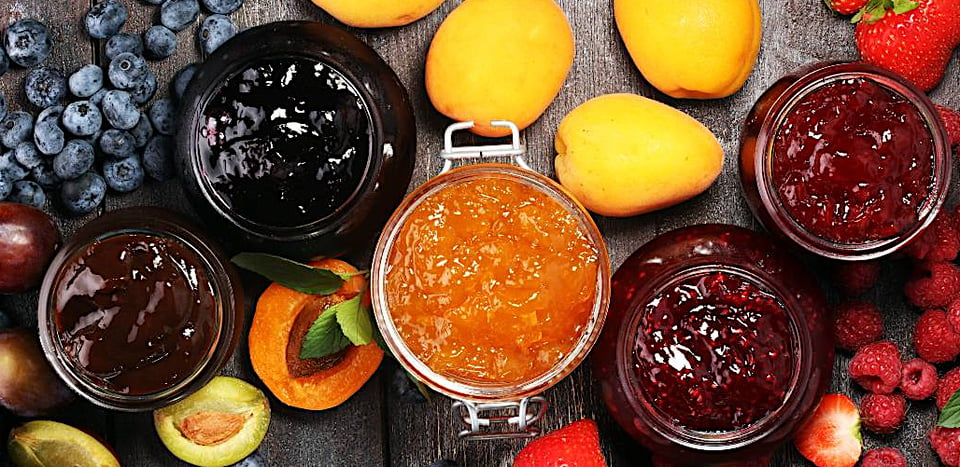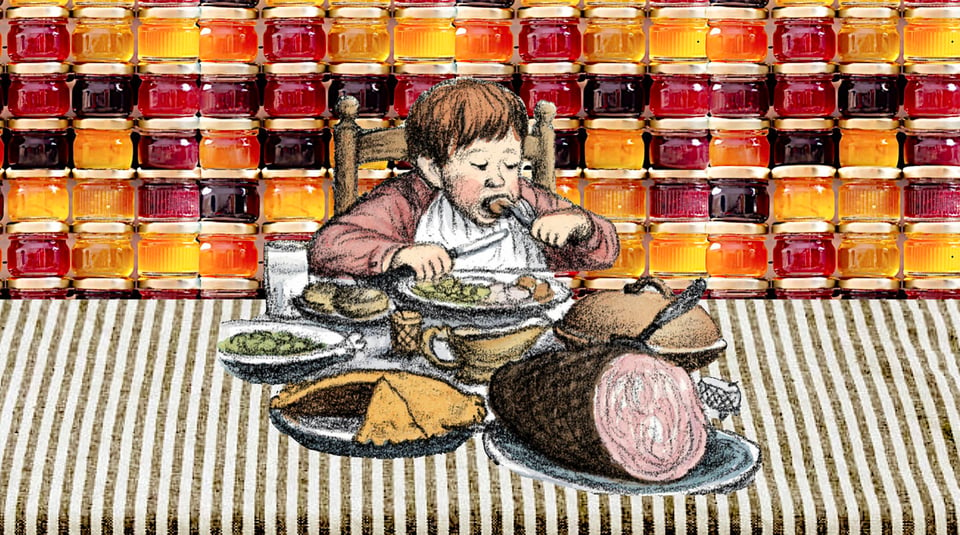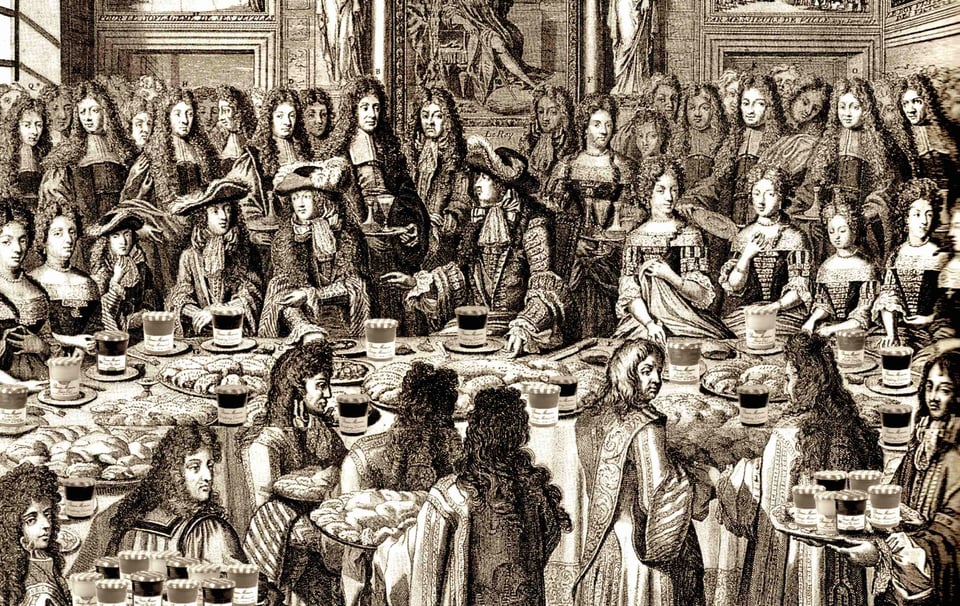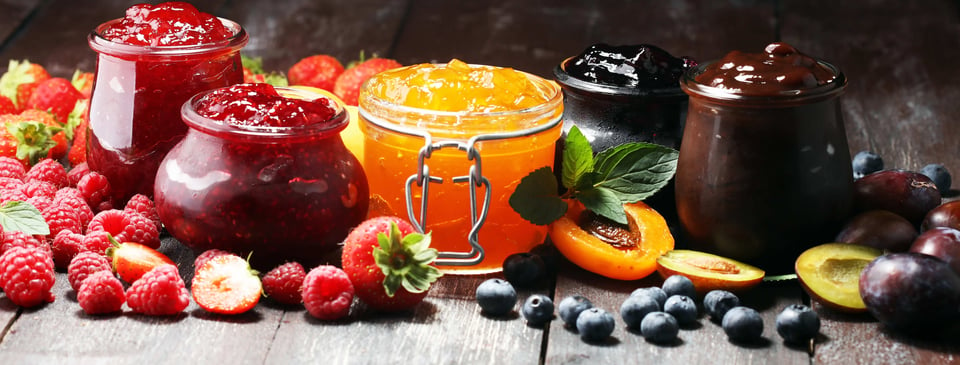Notable Sandwiches #93: Jam

Welcome back to Notable Sandwiches, the feature where David and I stumble our way through the bizarre and mutable document that is Wikipedia’s List of Notable Sandwiches, in alphabetical order. This week, a UK staple: the jam sandwich.
BECOME A PAID SUBSCRIBER

In my Manhattan kitchen, perched atop the toaster oven, there’s a white-and-gold ceramic bowl that is full of provisions from France. There are tins of foie gras, cou de canard farci, and, redder than blood, a pot of jam, fruits rouges, and another, a delicate pale shade, of pêche blanche de Corse. I went to Paris in June 2023, and have dipped reluctantly into this hoard a few times in the year since—for entertaining guests, or in moments of sorrow or elation. Rillettes and terrines have vanished one by one, but the jam remains. I am saving it for the day I need it, and I will know that day when it comes.
I think of jam that way: sweetness stockpiled against a day of need. It is an assurance that no matter how grim things get, no matter what befalls me or those I love, someday I will be able to savor a spoonful of white peaches from Corsica, distilled and preserved at their ripest, a taste of Mediterranean sun from a faraway orchard, one I’ll never see, saved for me in glass and sugar and sealed away until a bitter winter.
That’s what jam has always been: a way to preserve sunshine in a storehouse, brightness salvaged for times of pall, bounties of warm fruit boiled and sweetened to keep when no fruit grows on the boughs. Laura Ingalls Wilder, chronicler of American homesteading life, describes one winter feast in Farmer Boy (the book that made me the hungriest of any book I have ever read) in which the main character, having been hungry all day, goes absolutely bonkers on the occasion of his teacher visiting for dinner and his parents pulling out all the stops. All the food is winter-preserved—ham from the autumn slaughter, root vegetables, and an array of preserves.

Almanzo ate the sweet, mellow baked beans. He ate the bit of salt pork that melted like cream in his mouth. He ate mealy boiled potatoes, with brown ham-gravy. He ate the ham. He bit deep into velvety bread spread with sleek butter, and he ate the crisp golden crust. He demolished a tall heap of pale mashed turnips, and a hill of stewed yellow pumpkin. Then he sighed, and tucked his napkin deeper into the neckband of his red waist. And he ate plum preserves and strawberry jam, and grape jelly, and spiced watermelon-rind pickles. He felt very comfortable inside. Slowly he ate a large piece of pumpkin pie.
The Romans made their jam with honey, according to that venerable culinarian, Apicius; honey has the added beneficial property of keeping bacteria away. Honey jam was de rigeur until the Columbian exchange and slave labor made cane sugar the sweetening agent of choice; Nostradamus, most famous for his prophecies, wrote an entire treatise on jam, including instructions for making a “love jam” with 700 grams of finest sugar, guaranteed to cause even the most frigid of women to burn with love (the recipe also involves mandrake apples, ground magnetite, honeyed octopus tentacles, blood from sparrows’ wings, and the root of the Bee’s Laughter plant, so most of us will have to take his word for it).

Before the eighteenth century, the cost of sugar made jam a luxury. Its consistency was more solid than the jam-sandwich condiment we know and love, and this block-like quince paste—then known as marmalade—was a treat reserved for the courts of kings and their nobles. Marmalades and confits of fruit graced the table of Louis XIV, the Sun King. He did not need to wait for spring to return for sweetness.
It took the price of sugar dropping for jam to achieve a soft, spreadable consistency, aided by pectin—the chemical agent that gives jam its gel-like consistency and naturally occurs in some fruits—being isolated and commercially sold in 1825. By the late nineteenth century, the relief of tax duties on sugar made England a jam-making empire, with ordinary housewives putting up preserves for the winter, and aristocratic ladies nibbling on jam sandwiches at high tea. Queen Elizabeth II reportedly ate one every day for over 90 years.
The Sword and the Sandwich is a newsletter about deadly serious extremism and serious sandwiches. Please consider supporting this work with a paid subscription.
In Russia and Ukraine, where I’ve spent both summers and winters, one drinks tea with a spoonful of jam beside it, to stir in and sweeten the bitter brew. In summer, this is a joyous luxury; in winter, when the sky is iron-gray for weeks at a time and the snow-torrents rarely cease and black ice coats the roads and streets, it feels like a necessary respite, a piece of the sun in your mouth when you need it most, against the darkness of the cup and the sky.
I can hold my jar of white-peach jam in my hands and think myself back to France, for just a moment, a good moment—the sun was so hot at Versailles, and I kissed someone I loved and bought inordinate amounts of cheese, and it’s raining here, raining that tiresome cold early-April rain that means I can’t plant tomatoes yet. I am holding it in reserve still, perhaps I will hold it for years, until some day comes that is too beautiful or too terrible for the hope of peaches to outweigh the need for peaches. I keep it because I’ll need it someday; today I only need the hope of it, that sweet, saved-up thing, something reserved for myself against a bitter future.

When I eat it I will eat it straight out of the jar—no need to spread it on bread or any other intervening surface. I will eat it with my fingers and lick them clean, because a sweetness so long awaited, once met, can’t be impeded in any fashion. Or, as John Darnielle, the bard of the Mountain Goats and a personal hero of mine, put it in his 2001 anthem "Jam Eater Blues":
Life is too short to refrain from eating jam out of the jar
Life is too short to refrain from eating jam out of the jar
And life is too short to wait around for you to come home tonight
Life is too short
Too short to do thatLife is too short to leave the windows open all winter long
Life is too short to leave the windows open all winter long
I'm gonna lock 'em up tight and eat jam out of the jar all night
Cause life is too short to make toast
Or use spoons or napkinsLife is too short to spend the rest of it down here in Tampa
Life is too short to spend the rest of it down here in Tampa
Yeah, life is too short to let it go to waste like this
But I never tasted jam before that tastes like this
And life is too short to refrain from eating jam out of the jar
Like Almanzo Wilder and John Darnielle, I believe jam is something to be indulged in without reservations. It is something that should make you tuck your napkin deeper into your neckband, something for a long winter night with the windows shut, something for solitary and ecstatic pleasure. This week, I wish you the reward of a saved-up sweetness; as the ramps and wild garlic sprout in the cold wet earth and buds emerge from greenwood twigs, you should, also, rise up green and shining and sticky, with a good taste humming in your mouth, to preserve you for as long as you need it.
Love,
Talia

-
I love this so much! Beautiful!
-
So lovely, Ms. T.L!
-
Beautiful.
-
I make loganberry jam every summer for this and other purposes. I would send some if I thought it would escape the tentacles of US Customs, but like foie gras de canard, it's probably classed as a munition.
Add a comment: